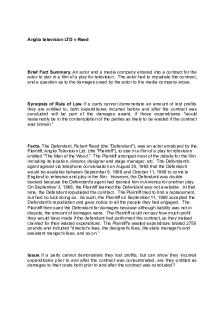Robinson v Balmain New Ferry Ltd PDF

| Title | Robinson v Balmain New Ferry Ltd |
|---|---|
| Course | The Law of Torts |
| Institution | Victoria University of Wellington |
| Pages | 2 |
| File Size | 76.2 KB |
| File Type | |
| Total Downloads | 38 |
| Total Views | 136 |
Summary
Detailed case brief including page/.paragraph references
Topic: trespass to the person...
Description
Robinson v Balmain New Ferry Ltd Area of law concerned:
False Imprisonment
Court:
Privy Council (Australia)
Date:
1910
Judge:
Lord Loreburn LC
Summary of Facts:
Plaintiff purchased a one-way ferry ticket from Sydney to Balmain. He decided to leave the wharf while waiting for his ferry, and was asked to pay 1 penny. Signs near the turnstiles read “Notice. A fare of one penny must be paid upon entering or leaving the wharf. No exemption will be made to this rule, whether the passenger has travelled by the ferry or not.” Plaintiff refused to pay another penny. He tried to force his way past two employees, and managed to get through the turnstile. Robinson sued for false imprisonment.
Relief sought: Issues:
Issue of principle
Class Issue statement: Material Facts: Procedural History:
He succeeded at trial on the basis that he hadn’t seen the signs. This verdict was set aside by the rule nisi. This was discharged by the Supreme Court of NSW, two judges finding that P had no notice of the signs and a third finding that Balmain Ferry ad given reasonable public notice of the conditions for entering the wharf. The High Court of Australia found that Robinson had notice of the conditions. It was part of the contract governing his going onto the wharf. Robinson appeals.
Defendant’s arguments:
Robinson owes the defendants a penny via the contract (entered into upon going onto the wharf), so they’re entitled to imprison him until he has paid that penny. Consequence- if the court found for Robinson, it would have been a practical disaster.
Plaintiff’s arguments: Result:
Judgment for the defendants
Judge’s reasoning:
The plaintiff was merely called upon to leave the wharf in the way in which he contracted to leave it. There is no law requiring the
defendants to make the exit from their premises gratuitous to people who come there upon a definite contract which involves their leaving the wharf by another way. The defendants were entitled to resist a forcible passage through their turnstile. The notice was immaterial, however. When the plaintiff entered the defendant’s premises there was nothing agreed as to the terms on which he might go back, because neither party contemplated his going back. When he desired to do so the defendants were entitled to impose a reasonable condition before allowing him to pass through their turnstile from a place to which he had gone of his own free will. Defendants were entitled to impose a reasonable condition on exit.
Plaintiff’s conduct was unreasonable, appeal dismissed. What can be learned from this case....
Similar Free PDFs

Robinson v Balmain New Ferry Ltd
- 2 Pages

Gustav & Co Ltd v Macfield Ltd
- 15 Pages

Twinsectra Ltd v Yardley
- 6 Pages

Oscar Chess, Ltd. V Williams
- 3 Pages

Perre v Apand Pty Ltd
- 2 Pages

Regal (Hastings) Ltd v Gulliver
- 5 Pages

Brinkibon Ltd v Stahag Stahl
- 1 Pages

Graham v Portacom NZ Ltd
- 4 Pages

Hunter v Canary Wharf Ltd
- 3 Pages

Gambotto v WCP Ltd-1
- 40 Pages

Halsey v Esso Petroleum Ltd
- 2 Pages

Anglia television LTD v Reed
- 2 Pages

Morsi v. Fermar Paving Ltd
- 3 Pages

Spice Girls Ltd v - Case
- 43 Pages

Shogun Finance Ltd v Hudson
- 45 Pages
Popular Institutions
- Tinajero National High School - Annex
- Politeknik Caltex Riau
- Yokohama City University
- SGT University
- University of Al-Qadisiyah
- Divine Word College of Vigan
- Techniek College Rotterdam
- Universidade de Santiago
- Universiti Teknologi MARA Cawangan Johor Kampus Pasir Gudang
- Poltekkes Kemenkes Yogyakarta
- Baguio City National High School
- Colegio san marcos
- preparatoria uno
- Centro de Bachillerato Tecnológico Industrial y de Servicios No. 107
- Dalian Maritime University
- Quang Trung Secondary School
- Colegio Tecnológico en Informática
- Corporación Regional de Educación Superior
- Grupo CEDVA
- Dar Al Uloom University
- Centro de Estudios Preuniversitarios de la Universidad Nacional de Ingeniería
- 上智大学
- Aakash International School, Nuna Majara
- San Felipe Neri Catholic School
- Kang Chiao International School - New Taipei City
- Misamis Occidental National High School
- Institución Educativa Escuela Normal Juan Ladrilleros
- Kolehiyo ng Pantukan
- Batanes State College
- Instituto Continental
- Sekolah Menengah Kejuruan Kesehatan Kaltara (Tarakan)
- Colegio de La Inmaculada Concepcion - Cebu
